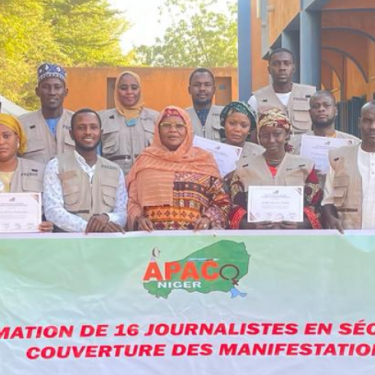RSF supports Niger’s journalists with safety training, safety equipment, first-aid kits

Thirty journalists from all over Niger have been given safety training and safety equipment thanks to support from Reporters Without Borders (RSF) for the Niger Section of the Association of African Communication Professionals (APAC-Niger). Local trainers will now extend this initiative to Niger’s eight regions.
In two training sessions held in November in the capital, Niamey, the 30 journalists were given training in physical safety and Niger’s media legislation, while 300 first-aid kits and identification vests were distributed.
“I believe I have acquired skills and developed reflexes that are essential in terms of personal security and first aid,” said Youssouf Sériba, the editorial director of the online media Les Échos du Niger, at the end of the training.
“I now know how to prepare and to ensure my safety when I go into the field,” said Salamatou Yazi, a journalist with the public radio station La Voix du Sahel.
Following the two training sessions, the journalists will deploy this initiative throughout Niger’s eight regions, in order to pass on the knowledge they have acquired at the local level and distribute equipment to media workers.
This solidarity initiative with journalists and media in Niger comes in a social and political context marked by last July’s military coup, which had repercussions on the right to information, including the suspension of international media, attacks on journalists by demonstrators, and an increase in disinformation. We will continue to advocate for journalists to be able to work freely without risk of reprisals.
Ready to work in “hostile” environment
The training provided with RSF’s support and carried out by a local partner focused on the safety of journalists both in their workplace and in the field. By means of practical exercises, they learned to identify risky situations and to adopt all appropriate measures to ensure their safety and that of their colleagues.
The first-aid training enables participants to act with complete confidence when faced, for example, with cases of bleeding, choking or loss of consciousness. They also learn to use emergency care products and accessories in the event of injuries. This was the first time that media outlets have been given first-aid kids.
“My media did not have first-aid kits even though they are very useful and necessary for the well-being of employees,” said Dalatou Mamane, the director-general of the Niger Press Agency (ANP).
“This support from RSF is of inestimable value for our organisation and for journalists in Niger. Thanks to this partnership, APAC-Niger is the first socio-professional organisation in the media sector to organise safety and first-aid training for groups of journalists in Niger – for a total of 15 women and 15 men from the media from all over the country. Thanks to this training, and to the first-aid kits and press-labelled vests that are being made available to them, they are now better able to practice journalism in the country’s current context.”
Amina Niandou
APAC-Niger president
Physical and verbal attacks on both local journalists and visiting foreign journalists were reported in the days preceding the coup in July. In the course of the many press freedom violations since July, freelance journalist Samira Sabou has been held incommunicado, local retransmission of the French international news broadcasters RFI and France 24 has been blocked, disinformation has spread like wildfire on social media and been picked up by certain news media outlets, and the authorities have threatened to use a cyber-crime law against the media. In such an environment, journalists need to be ready and able to protect their safety.
